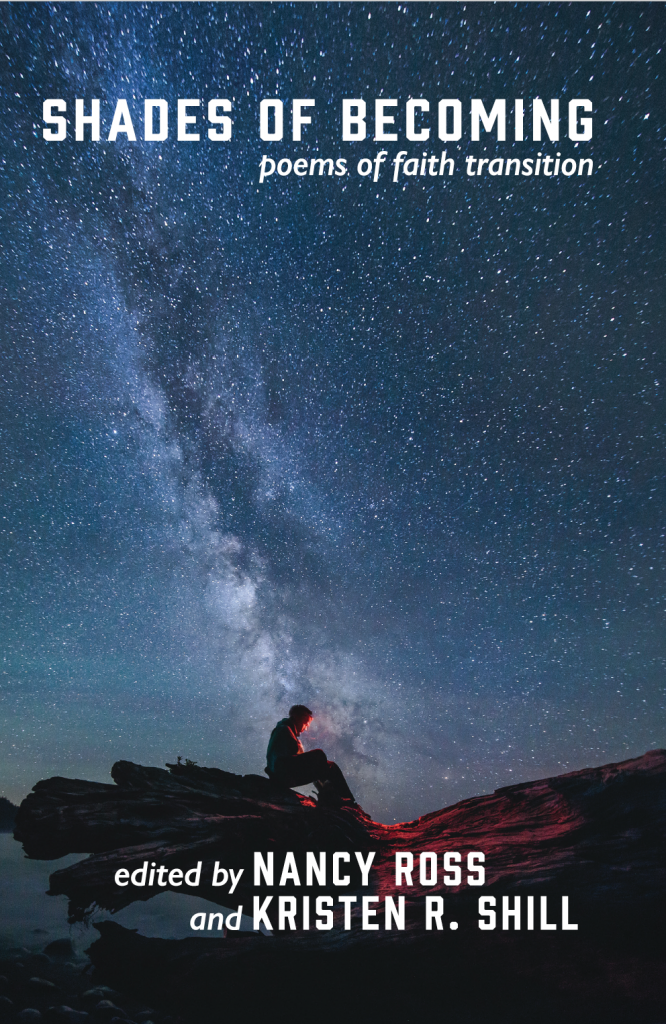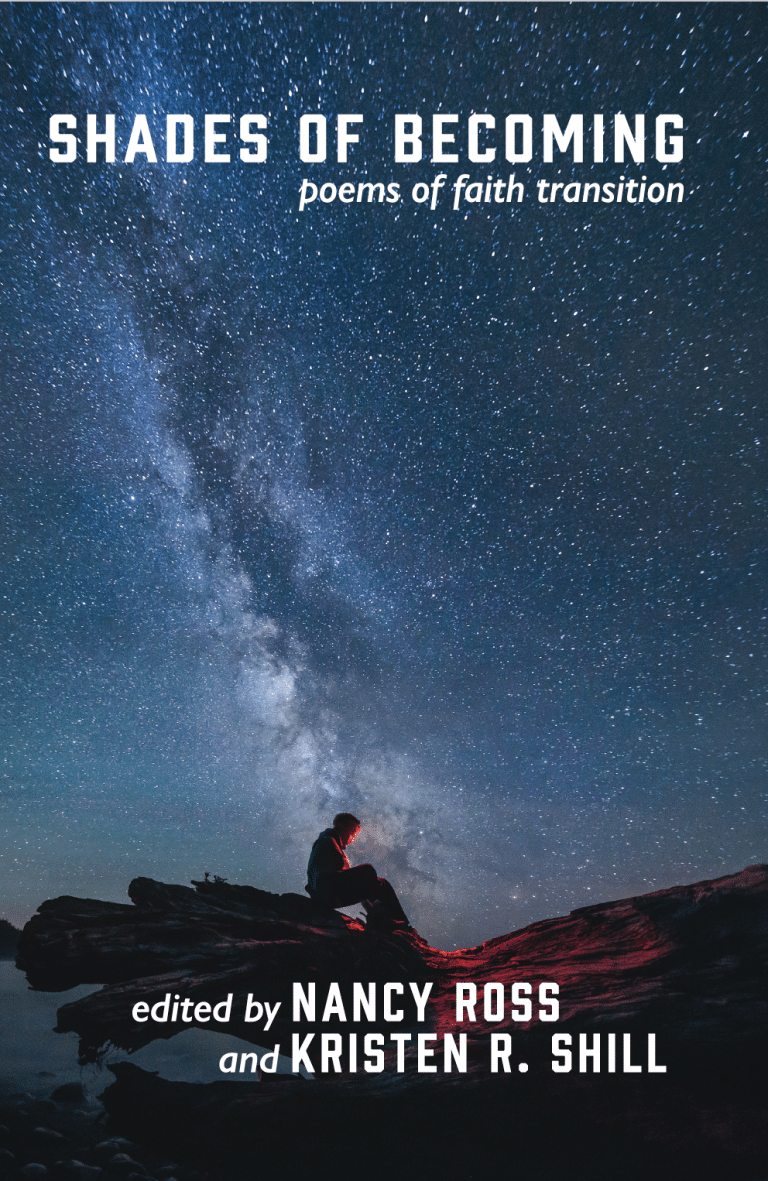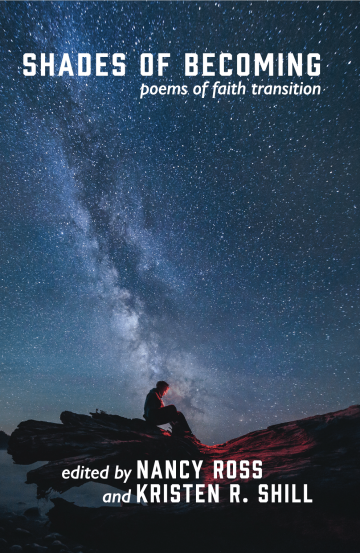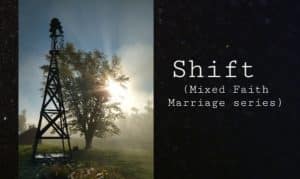
July 2019
By LMA
The compilation of poems in “Shades of Becoming: Poems of Faith Transition” edited by Nancy Ross and Kristen R. Shill is direct, powerful, introspective, affirming, and very much needed. In the introduction of the book, Nancy Ross explains the book is framed using three different developmental components of faith transition and change: 1. In the shallows (early stages of faith transition and loss). 2. The deep end (more intense and developed pain and anger). 3. Finding ground (resolution).
These are some of the themes that brought comfort, clarity, and validation to my experience of faith transition:
Theme 1: There is power in giving voice to anger, pain, and loss experienced in faith and faith transition. The collection of poems in “Shades of Becoming” describe with sharpness, directness, and power the emotions, questions, and experiences involved in faith and experiencing a faith transition. The poems describe with clarity the unanswered questions involved in a faith transition (The Questions, Josie Chilton, p. 34; Storage, Maren Chen, p. 61) and the inequity and pain of not having a place of safety and comfort within our faith (untitled, Coral Rose Goplin, p. 58).
One of the loveliest parts of the poems in this volume is that the authors speak pragmatically, honestly, and assertively about the many inequities, pain, and losses experienced in our faith. As women+ or female-identifying people, we are often not taught to directly name our pain or the unspoken truths about our faith or how it has affected us. Allison Ulrich (untitled, p. 64) writes about the complexity of her experience, experiencing both comfort and betrayal in our church. In addition, J. Marie Murphy eloquently writes about an experience with her grandmother asking “you still go to church, don’t you?” The poem powerfully describes the pain and anger and sadness of patriarchy, and the ways our mothers, grandmothers, and other women we love experience patriarchy, even if they do not perceive it as causing them pain. She writes, in part (see p. 55):
Excerpt from Donna by J. Marie Murphy:
I confess that her heart may not have broken
But mine did
Broke knowing how she must’ve been systematically
Disrespected
And overlooked
Broke knowing
Her clever mind and sharp sensibilities
Were ignored
Her skills patronized
My heart breaks for the tidy woman,
Comfortable shrouded in floral wallpaper
Comfortable shrouded in the fog of patriarchal righteousness
Her heart may not have broken,
But mine did
I don’t even have to know her story
To know her story
Don’t we all
All of us women
Birthed or bred into piety
Saddled with scripture
Have a version of the same story?
Theme 2: There is power in showing bold and unconditional love, acceptance, and protection for the parts of ourselves that have been wrongly made to feel bad, ashamed, or unacceptable, especially within the context of faith. My favorite parts in this book are the poems that describe the ways we can lean into and find power and comfort from those parts of ourselves that are misunderstood and seen as less acceptable, particularly within the context of faith. There is so much in our faith that is punishable in various ways and to various degrees. There is something so lovely and delicate and subversive about understanding and knowing and protecting those parts of ourselves. The parts that doubt. The parts that are unclean. The parts that are human. The parts that are wild. The poems present reminders that as humans, we require time in wild spaces (Sacred Wild, Keira Shae, p. 68) and that we are already whole (holy, Kristen R. Shill, p. 100).
For me, one of the stand-out poets in the volume is J. Marie Murphy. She unequivocally writes she does not need absolution, which she defines as “a cleansing, a purification, an exoneration, of the wrong-doings, the wrong-feelings, the wrong-choosings” (Absolution, p. 9). Later on, she describes how absolution is like bleach that makes everything white, and that “I have never been nor do I aspire to be a white, bright T-shirt. I have always been Indigo dyed, woven thread of denim. And I think I prefer it that way… let me be worthy without bleach” (Absolution II, p. 28).
The poems also describe ways we can rely on our own heart and intuition as a “solitary point of honesty.” Sarah Broat writes one of the most delicate and lovely poems in the entire volume that talks about the power in allowing yourself to love things and people you love and to rely on your own intuition (see “Of Hearts and Boxes, p. 77). She says “I saw you and my soul lit up. God said no. The Church said no. But my heart said yes” (see p. 77). In a faith that is so threatened by the very being and existence of certain groups of people (e.g., queer people, trans people, women) and the many varied and lovely intersections of identity its members embody (e.g., intersections of sex, gender, race, marital status, anatomy, mental and physical ability), this level of self-understanding, trust of one’s inner-voice, vulnerability, and self-care is so delicate and powerful.
Theme 3: Spiritual life is deeply complex and intricate, and can be experienced differently at different times in our lives. The poems also describe the deep complexity of faith and spiritual life, and the ways we as individuals conceptualize our experiences in faith. The poems describe how faith and certain aspects of our faith are deeply intricate and can feel different ways at different times in our lives. For example, in “Geology Lesson,” Susan Meredith Hinckley describes the many different ways her faith has felt (e.g., a stone so heavy it requires angels to move it, a stone skipping across the water, a pebble in her shoe, a rock in her pocket; see p. 38). She later writes that God is everywhere and “speaks to us in any language we can understand” (e.g., birds, trees, silence, eyes, faces, pie, dishwater, song; see Babel, p. 73). Others describe the pain of trying to find and hear God, constantly asking for them, and finding nothing, and then finally hearing a simple answer of “I am here” (When I Prayed Again, Mette Ivie Harrison, p. 41). The complexities of managing trauma experiences related to faith and faith transition also affect our lives (Absolution III, J. Marie Murphy, p. 80).
Theme 4: Resolution follows the pain and loss of any experience related to faith transition, finding a new faith, or leaving faith completely. The poems describe the resolution process that follows the loss, pain, and restructuring that accompanies faith transition in any form (e.g., leaving one’s church and going to a new church, leaving one’s church and not returning to any church). Coral Rose Goplin describes this process like a form of childbirth. She writes “I birthed this faithlessness. Long contractions growing intensity. Pain. Anguish. Despair. The tearing away of something nurtured and sustained so long. Until it is separate. No longer mine” (losing faith, p. 74). Others describe the delicate sifting process that is required during this resolution phase where we must decide what aspects of our faith and spiritual identity must be kept, and what should be left behind (A blessing for those who begin, Nancy Ross, p. 5; Bricks, Stephanie Sorensen, p. 75).
I highly recommend “Shades of Becoming: Poems of Faith Transition” to anyone experiencing faith transition in any form. These poems are important, needed, and powerful. I hope reading these poems provides validation, comfort, and safety for those who read them.
What poems spoke to you? How did they make you feel?
For a bulleted list of the poems according to the themes discussed in this review, please click here.







3 Responses
Thank you for this thoughtful, detailed review of this vividly imaged poetry. I look forward to reading it.
Thanks for including meaningful passages.
The four sections reflect a journey we may share w the authors and each other. I love it when someone captures a thought or feeling that speaks of my own experience. I also appreciate the hope within the fourth section.
beautiful review LMA
This book sounds incredible! Thanks for including quotes and some gems from it in your review. It sounds like a definite read. 🙂